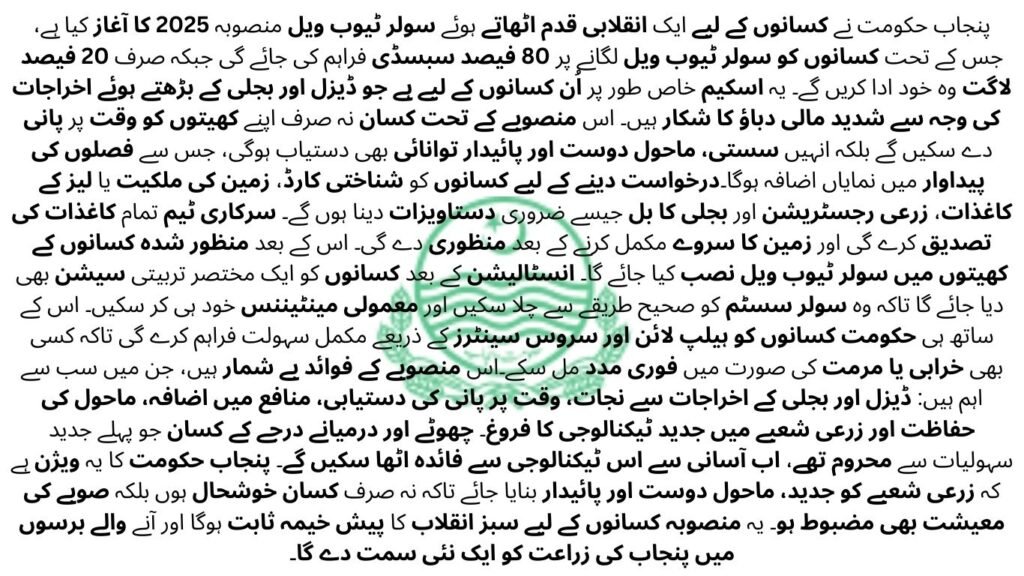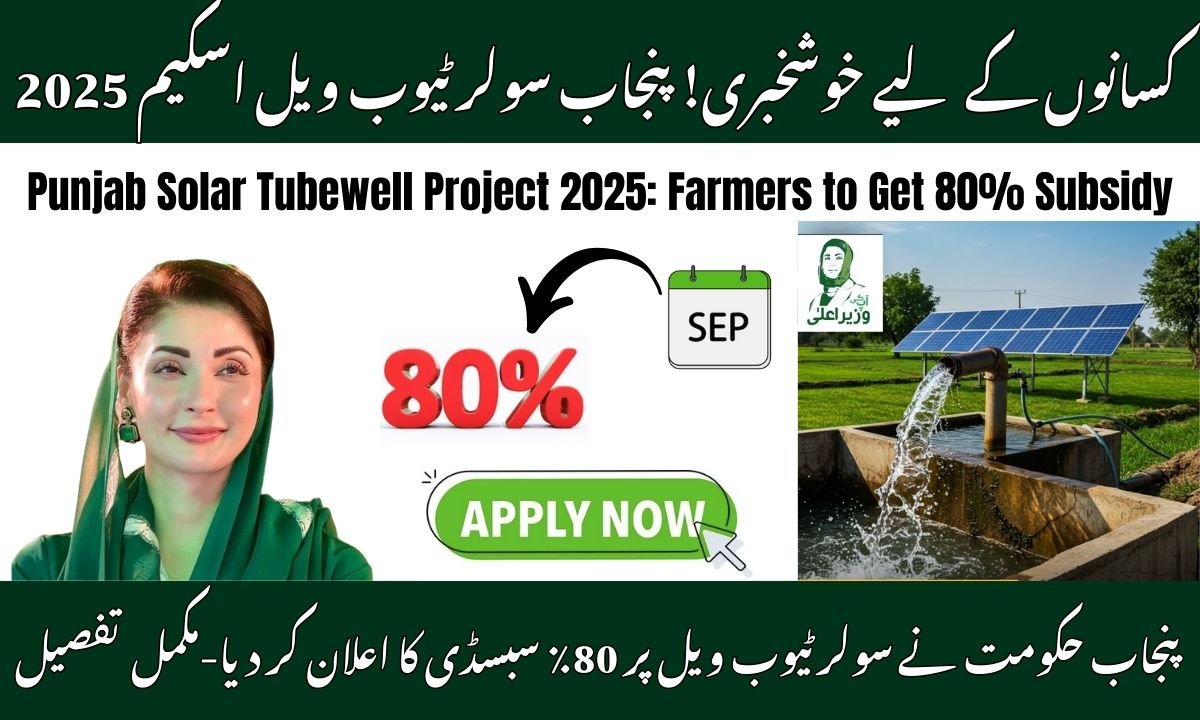The Punjab Solar Tubewell Project 2025 is one of the most important initiatives announced by the Government of Punjab to support farmers. Under this project, farmers will get 80% subsidy on solar tubewells, making it easier and cheaper to irrigate their fields without relying on expensive diesel or electricity. The Punjab government, led by CM Maryam Nawaz, has officially approved this project in the Budget 2025, aiming to provide financial relief to farmers and promote sustainable agriculture across the province.
This step is a game-changer for the farming community, especially small landowners who struggle with high fuel costs, power shortages, and rising inflation. With solar-powered tubewells, farmers will not only save money but also have uninterrupted access to water for crops. The subsidy ensures that farmers pay only 20% of the cost, while the government covers the rest. This project will help reduce dependency on costly diesel pumps, improve crop yields, and support eco-friendly energy use in agriculture.The Punjab Solar Tubewell Project 2025 is expected to benefit farmers in both rural and semi-urban areas by providing them with modern irrigation facilities. By focusing on renewable energy, the government is ensuring that agriculture becomes more productive and environmentally friendly. Farmers who qualify for this scheme can register through the official agriculture department portal or visit their local offices to apply and verify their information.

Punjab Solar Tubewell Project 2025 – Key Details
| Key Point | Details |
|---|---|
| Budget Year | 2025 |
| Project Name | Punjab Solar Tubewell Project |
| Subsidy Rate | 80% subsidy (farmers will only pay 20% of the cost) |
| Coverage | All districts of Punjab included |
| Policy Status | Officially approved in Punjab Budget 2025 |
| Support Type | Solar-powered tubewells for irrigation |
What Is the Punjab Solar Tubewell Project?
The Punjab Solar Tubewell Project 2025 is a government initiative aimed at providing farmers with solar-powered tubewells at highly subsidized rates, thereby making irrigation more affordable and reliable. The main purpose of this project is to reduce farmers’ heavy dependence on diesel and electricity for watering crops, which often leads to high expenses and delays during power shortages. By introducing renewable energy in agriculture, the scheme aims to lower the overall production cost of crops, support small and medium farmers, and promote sustainable farming practices across Punjab. This project will not only help farmers save money but also improve crop yield and food security, ensuring that even rural communities have stable access to water for irrigation. With an 80% subsidy on solar tubewells, the government is opening doors for farmers to adopt clean energy solutions while securing their livelihood and boosting Pakistan’s agricultural sector.
Why is the 80% Subsidy Important?
The 80% subsidy is designed to ensure that every farmer, even those with limited income, can afford solar tubewells. Here’s why it matters:
- Farmers spend a big portion of their earnings on diesel and power bills
- Energy shortages often cause delays in watering crops
- Climate change is increasing the need for reliable irrigation
- Small farmers, who form the backbone of Punjab’s agriculture, need financial support
This subsidy will make irrigation cost-effective, reliable, and sustainable for millions of farmers.
Required documents for the Punjab Solar Tubewell Project 2025:
- Valid Computerized National Identity Card (CNIC)
- Proof of agricultural land ownership (Fard/Registry) or lease papers
- Recent passport-size photographs
- Copy of electricity bill (if applicable for verification)
- Filled out the application form from the Punjab Agriculture Department
- Proof of farmer registration (if already registered with the Agriculture Department)
Contact details (mobile number for verification updates)
How to Apply for Punjab Solar Tubewell Project 2025 – Step-by-Step Guide
Applying for the Punjab Solar Tubewell Project 2025 is very simple, but farmers must carefully follow all the steps to ensure their application is accepted. The government has made the process farmer-friendly so that even those in rural areas can easily register and benefit from this solar irrigation subsidy scheme. Here’s a detailed guide:
- Visit the Official Website or the Agriculture Office
Farmers can start the application by visiting the Punjab Agriculture Department’s official website. For those who cannot apply online, the government has also set up agriculture offices at the tehsil and district level, where farmers can go in person and submit their request. - Fill Out the Solar Tubewell Application Form
After accessing the portal or office, you will need to fill out the official application form. This form asks for your CNIC details, land ownership or lease papers, contact number, and farming information. Make sure all the information is accurate, as any mismatch can delay the approval process. - Attach Required Documents
Along with the form, farmers must attach important documents such as their valid CNIC, land ownership proof (Fard/Registry), lease papers (if land is rented), recent passport-size photographs, and a copy of their electricity bill if available. These documents help the department verify that the applicant is a genuine farmer. - Deposit the Farmer’s Contribution (20% Payment)
Since the government is providing an 80% subsidy on solar tubewells, farmers only need to pay 20% of the total cost. This payment can be deposited through designated banks or the agriculture department counters. After making the payment, keep the receipt safe, as it will be required during verification. - Verification and Approval Process
Once the form and documents are submitted, the Agriculture Department will verify the farmer’s details through land records and CNIC checks. If everything is correct, the application will be approved. Farmers will receive an SMS or official call confirming their eligibility. - Installation by Authorized Vendors
After approval, the government will send an authorized solar vendor to install the tubewell on the farmer’s land. The vendor will handle the setup, including solar panels, motor connection, and water supply testing. Farmers do not need to worry about technical installation, as it will be fully managed by experts. - Start Using Your Solar Tubewell Once installed, the farmer can immediately begin using the solar irrigation system. This ensures free irrigation powered by solar energy, helping reduce costs, save fuel, and provide a continuous water supply for crops.
Details of Subsidy
Under the Punjab Solar Tubewell Project 2025, farmers will receive a massive 80% subsidy on installing solar-powered tubewells. The subsidy amount depends on the power capacity (KW) of the tubewell. This step aims to reduce electricity costs, ensure uninterrupted water supply, and promote eco-friendly irrigation across Punjab.
| Sr. No. | Power Capacity (KW) | Subsidy Amount (PKR) |
|---|---|---|
| 1 | 10 KW | 500,000 |
| 2 | 15 KW | 750,000 |
| 3 | 20 KW | 1,000,000 |
Eligibility & Non-Eligibility Criteria for Punjab Solar Tubewell Project 2025
Not every farmer will qualify for the Punjab Solar Tubewell Project 2025. The government has set clear rules to make sure the subsidy reaches the most deserving farmers. Eligible farmers are those who truly need financial help for irrigation, while non-eligible farmers are usually those who already have strong financial resources or are not directly involved in farming.
| Eligible Farmers | Non-Eligible Farmers |
| Must be a registered farmer with the Punjab Agriculture Department | Farmers not registered with the Agriculture Department |
| Must have a valid CNIC | Farmers with invalid or expired CNIC |
| Own or legally lease agricultural land | Individuals without any land ownership/lease |
| Belong to the small or medium farming category | Large landowners with high agricultural income |
| Must agree to pay 20% contribution | Farmers are unwilling to pay their 20% share |
| No access to a reliable or affordable irrigation system | Farmers are already using government-funded irrigation schemes |
| Residing in the Punjab districts only | Farmers living outside Punjab |
Cost Breakdown of Solar Tubewell Installation
Under the Punjab Solar Tubewell Project 2025, the government has announced that farmers will receive an 80% subsidy, while they will only pay the remaining 20% of the cost. This cost-sharing model makes it easier for small and medium farmers to afford solar-powered irrigation systems.
For example, if the total installation cost of a solar tubewell is PKR 1,000,000, then:
- The Punjab Government will pay PKR 800,000 (80%)
- The Farmer will only pay PKR 200,000 (20%)
This significant subsidy not only reduces the financial burden but also encourages more farmers to shift towards sustainable, eco-friendly energy solutions.
Punjab Solar Tubewell 2025 – Cost Sharing Table
| Total Installation Cost | Government Subsidy (80%) | Farmer’s Share (20%) |
|---|---|---|
| PKR 500,000 | PKR 400,000 | PKR 100,000 |
| PKR 800,000 | PKR 640,000 | PKR 160,000 |
| PKR 1,000,000 | PKR 800,000 | PKR 200,000 |
| PKR 1,500,000 | PKR 1,200,000 | PKR 300,000 |
| PKR 2,000,000 | PKR 1,600,000 | PKR 400,000 |
Benefits of Punjab Solar Tubewell Project 2025
The Punjab Solar Tubewell Project 2025 is more than just a subsidy; it’s a lifeline for thousands of farmers who struggle every day with rising costs and power shortages. For years, farmers have spent half their income on diesel or waited helplessly for electricity to water their crops. This project finally gives them a permanent solution: an affordable, reliable, and eco-friendly solar irrigation system. With an 80% subsidy, farmers only need to pay a small share, while the government takes care of the rest.
Here’s how this project will truly change lives:
- Lower costs, higher savings: Imagine growing crops without worrying about expensive diesel bills or electricity charges. Farmers can now save money and use it for their family’s needs.
- Water when you need it: No more waiting for electricity or rushing to buy fuel. With solar tubewells, farmers can irrigate their fields anytime the sun is shining.
- Clean energy for a better future: Instead of relying on polluting diesel pumps, solar power brings a healthier, greener way of farming.
- Relief for small farmers: Those who never thought they could afford modern technology can now benefit, thanks to the 80% subsidy.
- Better crops, better income: Regular and timely irrigation means healthier crops, more production, and more earnings for farming families.
- Stronger rural households: Savings from irrigation costs can now go toward children’s education, medical care, or improving homes.
- One-time investment, long-term benefit: Solar systems last for years with very little maintenance, making this a smart and secure choice for farmers.
Life Before vs. After Punjab Solar Tubewell Project 2025
| Before (Without Solar Tubewell) | After (With Solar Tubewell 2025) |
| High expenses on diesel and electricity | 80% subsidy – farmers pay only 20% of cost |
| Frequent load-shedding and power shortages delay irrigation | Uninterrupted water supply with solar energy |
| Rising costs reduce profit from crops | Lower irrigation cost = higher savings and income |
| Dependence on polluting diesel pumps | Eco-friendly, clean renewable energy |
| Small farmers cannot afford modern irrigation | Even small & medium farmers get access |
| Limited crop yield due to irregular watering | Healthier crops and better yield |
| Stress on family finances | Extra savings for education, healthcare, and home needs |
Installation, Maintenance & Government Support – Step-by-Step Process
If you’re wondering how farmers will actually get their solar tubewells under this scheme, here’s the simple journey:
- Apply & Get Verified
Farmers first submit a short application with their CNIC and land ownership details. After that, the government team checks eligibility for the 80% subsidy. - Site Visit & Green Signal
A technical team visits the farm to see if the land and water resources are suitable for solar installation. Once everything looks good, the farmer gets the official approval. - Tubewell Installation
Authorized companies step in to install the solar panels, pumping system, and equipment. Farmers only pay 20% of the cost, the rest is taken care of by the Punjab government. - Quick Training Session
Farmers don’t have to worry about using new technology. A short training session is given so they know how to operate the solar tubewell and handle small issues on their own. - Aftercare & Support
The project doesn’t end with installation. Government-approved service centers and helplines are available for maintenance, repair, and warranty claims whenever needed. - Long-Term Monitoring
The solar system is regularly checked to make sure it runs smoothly. This way, farmers get an uninterrupted water supply without extra costs or stress.
In short, it’s not just about getting a solar tubewell, it’s about a complete support system that makes life easier for farmers today and keeps their future secure.
Agriculture Department’s Role – Quick Look
| Role | How It Helps Farmers |
|---|---|
| Awareness Campaigns | Ensures farmers know about the scheme |
| Application Guidance | Helps with registration & documents |
| Eligibility Verification | Confirms land ownership & CNIC details |
| Technical Advice | Guides farmers on maintenance |
| Monitoring & Transparency | Makes sure subsidy is fairly distributed |
Common Mistakes to Avoid During Registration
Many farmers are excited to apply for the Punjab Solar Tubewell Project 2025, but in the rush, some make small mistakes that delay or even cancel their applications. The good news is,you can easily avoid these errors if you know them beforehand.
Here are the most common mistakes farmers make during registration:
- Incomplete Documents: Many farmers forget to attach land ownership papers, CNIC copies, or electricity bills, which are required.
- Wrong Information: Even a small spelling mistake in your name or CNIC number can create verification problems.
- Using Expired CNIC: If your CNIC is not renewed with NADRA, your application will not be accepted.
- Late Submission: Some farmers wait until the last date, but due to heavy rush, their applications get delayed or rejected.
- Ignoring Eligibility Rules: Only landowners and verified farmers can apply. Tenants or those without proper documents often get rejected.

Final Thoughts
The Punjab Solar Tubewell Project 2025 with its 80% subsidy is a groundbreaking step by the Punjab government to empower farmers. It directly addresses the high cost of irrigation, supports eco-friendly energy, and strengthens food security in Pakistan. By reducing expenses and making irrigation reliable, this project will bring real change in farmers’ lives.
If you are a farmer in Punjab, this is the best time to:
- Apply through the agriculture portal
- Submit your documents and 20% contribution
- Get your solar tubewell installed for secure, affordable irrigation
This initiative is not just about subsidy, it’s about securing the future of farming in Punjab.
FAQs: Punjab Solar Tubewell Project 2025 – 80% Subsidy
Q1: What is the Punjab Solar Tubewell Project 2025?
The Punjab Solar Tubewell Project 2025 is a government initiative that provides farmers with an 80% subsidy to install solar-powered tubewells for irrigation.
Q2: How much subsidy will farmers get under this project?
Farmers will get 80% subsidy. For example, on a 10KW solar tubewell, the government will give PKR 500,000.
Q3: Who is eligible for the solar tubewell subsidy in Punjab?
All farmers in Punjab with agricultural land who need irrigation support are eligible for this scheme.
Q4: How much do farmers need to pay themselves?
Farmers only need to pay 20% of the total cost. The remaining 80% is covered by the government.
Q5: What is the subsidy amount for different tubewell capacities?
- 10 KW → PKR 500,000
- 15 KW → PKR 750,000
- 20 KW → PKR 1,000,000
Q6: How can farmers apply for the Punjab Solar Tubewell Project 2025?
Farmers can apply through official Punjab agriculture offices or the online portal .
Q7: What is the main benefit of solar tubewells for farmers?
The main benefit is reduced irrigation costs, reliable water supply, and clean energy use, which helps increase crop production.
Q8: When will the Punjab Solar Tubewell Project 2025 start?
The project has been approved in the Punjab Budget 2025 and implementation is expected to start in september.

